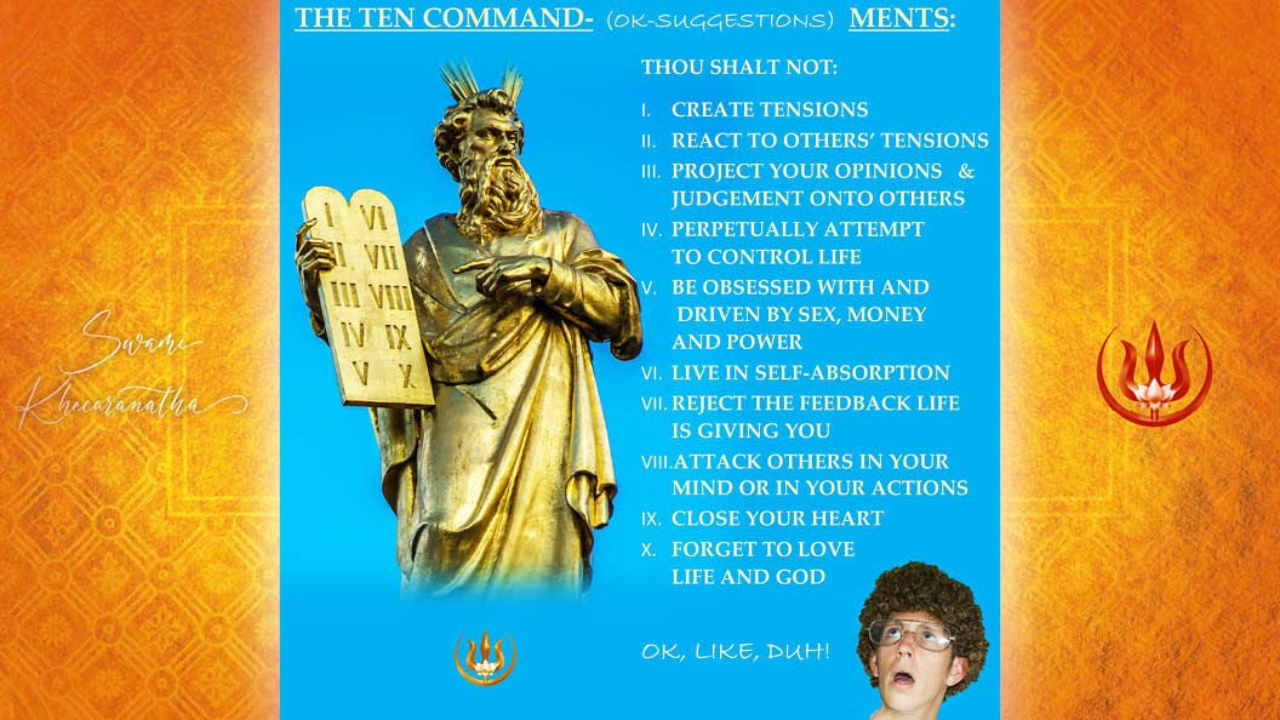The Ten Commandments

We’re all familiar with the Ten Commandments from the Bible. I was recently inspired, while supporting a student, to outline a different set of commandments — a list of “thou-shalt-not’s” — to serve as guidelines for how to help free ourselves of misunderstanding and limited identity. Each “commandment” is actually just a suggestion, because, ultimately, all a teacher can do is offer advice!
The Ten Commandments (Okay, Suggestions)
- Thou shalt not create tensions
- Thou shalt not react to others’ tensions
- Thou shalt not project your opinions and judgement onto others
- Thou shalt not perpetually attempt to control life
- Thou shalt not be obsessed with and driven by sex, money, and power
- Thou shalt not live in self-absorption
- Thou shalt not reject the feedback life is giving you
- Thou shalt not attack others in your mind or in your actions
- Thou shalt not close your heart
- Thou shalt not forget to love life and to love God
Not bad suggestions to live by, right? But how many of us follow them?
That’s why at the bottom of the image, there is, in addition to these suggestions, a geeky-looking guy saying, “Oh, like, duh!” The point of including him is that we can sit here and read these and think, “Well of course we shouldn’t create tensions, project our opinions onto others, or live in self-absorption.” And yet, if we’re honest with ourselves, how often do we choose to do the very things that trap us instead of those that will free us?
The Discipline of Conscious Choice
We always have the ability to choose. But all too often, seemingly by default, we end up making the choice to create tension, project our opinions onto others, and close our hearts. What is required is the conscious choice to engage life from a deeper place, so that we open instead of close.
In every situation we face, God is attempting to free us. Yet we often do not recognize what is happening and instead choose to perpetuate our misunderstanding. We take the same power that is trying to free us and usurp it to perpetuate our own binding.
Life is full of challenges. Tensions will arise and we will always face difficult dynamics in our life. At some time, we may all be obsessed with and driven by sex, money, or power. But we can develop the consciousness of discipline to choose something different.
We develop that discipline through vimarśa, the self-reflective capacity of our consciousness. This self-reflective capacity is our God-given ability to look at ourselves and know our state. Then we can change our consciousness by making a different choice, even in the midst of some difficult situation. So, even while experiencing a tense interaction with someone, we can choose not to close and then project our tensions back at the other person. We can choose not to fight or live in our self-absorption. We can choose, instead, to surrender and be free.
Discipline Builds the Foundation of Our Spiritual Building
As we cultivate our discipline of conscious choice and honor the ten commandments, we construct the foundation of our spiritual building. This is important because only from that foundation can we connect to, feel, and surrender to śakti, the power of Consciousness that is expressing our life and attempting to free us.
Without discipline, we’re like someone trying to build a twenty-story skyscraper without first digging the foundation. It doesn’t work. And, in fact, most tall buildings today begin several floors underground, so that even a major earthquake won’t knock them down. They will sway, but not break.
In terms of our experience, with a deep spiritual foundation, even the most challenging circumstances will not cause us to lose contact with our center or close our heart. We’re no longer so rigid in our old patterns that we get blown over or snap. Our freedom from misunderstanding and limited identity starts because we choose to stop repeating our limiting patterns. As the saying goes, “If you keep doing what you’ve always done, you’ll keep getting what you’ve always gotten.”
Don’t keep blindly doing what you’ve always done. Instead, refer back to these suggestions. Remember the little guy from the image above. You can even visualize him perched on your shoulder, and every time you are about to automatically react, simply imagine him saying, “Like, duh! Do you really want to do this?!”
Discipline Happens in the Moment
This is fundamental work, and it doesn’t start after we’ve been through an earthquake and the building has collapsed. It’s a little late then. Rather, it starts in the moment. We miss the moment if we’re not quiet, still, and deeply centered in ourselves.
Once we are centered in our heart, we can establish ourselves in the flow of śakti within the central channel and let that śakti sculpt our life. From that foundation of openness and inner flow, we engage our day and use every opportunity to deepen ourselves. Without tension, life becomes an exchange of fullness and joy, instead of something to fear or resist.
This is how we become free from all misunderstanding — free from our sense of limited identity and separation from God. Only then do we actualize the purpose of our life, which is to live in the unconditional freedom of God’s joy. Wouldn’t it be worth adopting a few suggestions to make that a reality?
